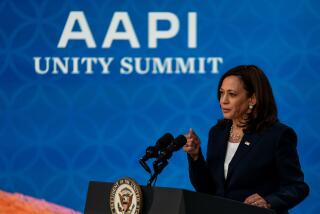New Definitions of Masculinity
- Share via
Asian American men tend to feel that they aren’t given a fair shake in our society when it comes to matters of masculinity. For me and I’m sure lots of others, adolescence was fraught with feelings of inferiority, which were tied inextricably to race. In my world all Asians seemed to be good at math and bad at sports, all the attractive Asian women dated only white boys and the only Asian men you saw on TV were expendable bad guys.
Yes, these are stereotypes only partly based in reality, but it becomes pretty easy to buy right into them and develop a poor self-image.
The responses to what seems like a grim situation are few. You can bear down to emulate the models open to you, giving your all to make a lot of money and drive a fast car and be a good basketball player or all of the above. You can choose to lash out at the system that keeps you down, vilifying Hollywood and the mass media and Asian women who date white men, and society in general. Or you can try to craft a different model of masculinity out of bits and pieces of the old. I’ve tried all three.
Perseverance came first. In our society, masculinity seems to be tied on the one hand to physical attributes and on the other to money and power. This is not something most of us question as young people. Accepting this definition led to depressing conclusions: No matter how much I could bench press, I was never going to fit the physical ideal no matter how hard I tried.
And though I was a good student, good at math and the sciences (of course), I proved pretty inept at making (and keeping) money in large quantities as well.
I fortunately discovered Asian American studies at about this time. It taught me, among other things, all about how oppressed I was. So anger came next. I became the revolutionary (in a nice Sansei boy kind of way). I determined to overthrow the old order. We had been kept down by the white man and he was going to pay. I learned of the history of negative media images of Asian men and got mad whenever I saw such images replicated in the present.
I also embraced such positive models as Bruce Lee on the rare occasions they appeared. I came to view Asian women who dated white men as sellouts, “bananas,” traitors to the cause.
As I got older and more mature, I began to see the fallacies in this perspective as well. After a while, it became clear that the picture was a lot more complicated and that Asian American studies was a lot more nuanced. Asian women who only dated white men were not the enemy but were victims of a different sort.
I also began to meet many attractive women who rejected the John Wayne or Clint Eastwood types (and the Asian American men who tried to be like them) and who were attracted to the likes of Woody Allen, Dick Cavett, even Ted Koppell. Where were these women when I was a teenager? (I know, I know--I was probably vilifying them for dating white guys.) I eventually learned that intelligence, wit, compassion, and emotional honesty were vital components in any new definition of masculinity for me.
In fact I think we Asian American men can play a unique role in transforming masculinity and male-female relations in our culture. Had I been born 6-feet-4, white and privileged, I would have had no reason for questioning dominant models of masculinity. But being just a regular Asian American guy, I had almost no choice but to do so.
We need to do all that we can to change things, whether by political action or by example. But we also have to accept that things aren’t going to change anytime soon and that we might have to make it work anyway. And that sometimes, what seems unfair actually is a blessing in disguise.


